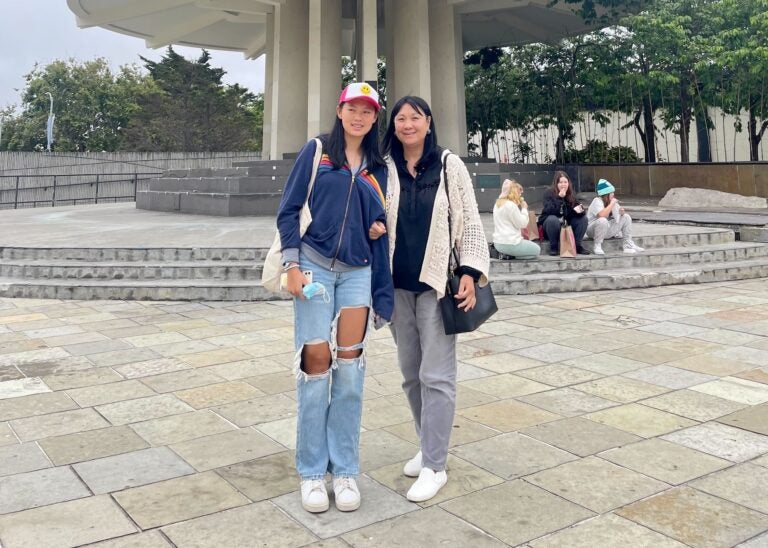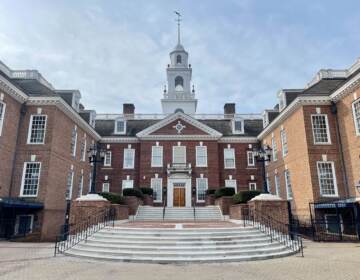Delaware expands cultural education requirements in K-12 curriculum
The bill started with a focus on Asian American, Native Hawaiian, and Pacific Islander history but expanded to include all ethnic groups.

Andrea Li, currently visiting her home country, China, with her 16-year-old daughter, has been part of the Make Us Visible group following SB297. (Courtesy of Andrea Li)
From Philly and the Pa. suburbs to South Jersey and Delaware, what would you like WHYY News to cover? Let us know!
The journey of navigating cultural identity and a sense of belonging can be complex and challenging for immigrants and first-generation students in the United States, especially within school settings where ethnic groups may not always feel equally represented or understood.
Across the nation, advocates are working to promote state-level legislation to enhance history education to include the history and contributions of people from all backgrounds and cultures.
Those advocates include groups like Make Us Visible, which launched in 2021 to promote the inclusion of Asian American and Pacific Islander culture in school curricula.
For Andrea Li, a first-generation immigrant who arrived in 2003 to study American Studies at Saint Louis University, the journey has been a blend of personal growth and adaptation. In 2008, she chose Delaware as her home to start a family with her husband and now has a 16-year-old daughter. As she navigates life in a new country, Li has experienced first-hand the challenges of maintaining her cultural identity while embracing American life.
“While reading the literature here [in the US] about Asian Americans, it was quite dark,” she said. “I see there are things that can be improved, like the lack of Asian American history in the curriculum. There are holes that need to be filled for [students’] education.”
“Right now, time has progressed. I feel like my daughter’s growing up experience [is] awesome, I’m not saying it’s perfect [either],” she added.
In 2018, Li began her tenure as a Chinese teacher at Shue-Medill Middle School in the Christina School District. Since then, she has been dedicated to teaching students in the Chinese immersion program. Driven by the misrepresentation and lack of cultural influences she observed in her own education, she is committed to bridging that gap through her work.
That also led to her involvement with Make Us Visible and their efforts to integrate diverse American histories into K-12 classrooms.
A bill for all cultural and ethnic groups
Last year, MUV launched a movement to include Asian American history in schools through its Delaware chapter, co-founded by Devin Jiang, advocating for educational changes with community stakeholders and lawmakers in the state.
Last month, state lawmakers gave unanimous approval to SB 297, a bill that mandates more inclusive history to be taught in all Delaware schools.
“We wanted to bridge the understanding gap because we have seen a rise in anti-Asian hate harassment and bullying in recent years,” Jiang said. “SB 297 serves as a preventive measure and solution to guard against racist rhetoric and violence.”
During its journey through Legislative Hall, the bill grew into something bigger and better, Jiang said, so “students can feel visible and see himself in their textbooks.”
“The important thing about SB297 is that our advocacy for it started out as requiring Asian American, Native Hawaiian, and Pacific Islander history to be taught in schools, but it eventually evolved to encompass all racial, ethnic and cultural groups,” he said. “It’s inclusive history legislation that requires the history of racial, ethnic and cultural groups to be integrated into Delaware’s K-12 School curriculum.”
With the bill still awaiting Gov. John Carney’s signature, its implementation process may be lengthy. The state Dept. of Education will now write the standard requirements. Advocates hope to offer public feedback before those standards are finalized.
Jiang said there are some key points he would like to see implemented.
“Normalize our stories and uplift the lives of Americans whose histories are untold. Showing portrayals of Asian Americans that are weaving the fabric of America, to show everyone that they’ve been keeping the country together, freeing the slaves in the Civil War, fighting to protect the country in World War I, marching for women’s rights and civil rights and so much more,” he explained.
Moving forward, MUV will continue to advocate for the immigrant community and participate in educational policy decisions made by the state and the DOE.

Get daily updates from WHYY News!
WHYY is your source for fact-based, in-depth journalism and information. As a nonprofit organization, we rely on financial support from readers like you. Please give today.






